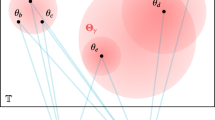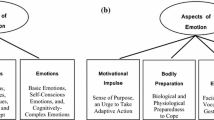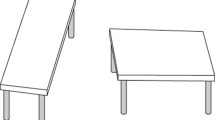Abstract
Machery’s book is an effort to show how experimental philosophy can be valuable without the perephenelia of intuitions. I argue that the effort fails.
Similar content being viewed by others
Notes
Machery calls it ‘Method of Cases 2.0’.
If this went by a bit fast, see Part II of Cappelen 2018 for elaboration.
References
Blackburn, S. (1999). Think: A compelling introduction to philosophy. Oxford: Oxford University Press.
Brandom, R. B. (2001). Modality, normativity, and intentionality. Philosophy and Phenomenological Research, 63(3), 611–623.
Burge, T. (1979). Individualism and the mental. Midwest Studies in Philosophy, 4(1), 73–122.
Cappelen, H. (2012). Philosophy without intuitions. Oxford: Oxford University Press.
Cappelen, H. (2018). Fixing language: An essay on conceptual engineering. Oxford: Oxford University Press.
Cappelen, H., & Deutsch, M. E. (2018). The crisis of method in contemporary analytic philosophy. Notre Dame Philosophical Reviews 1(05). https://ndpr.nd.edu/news/the-crisis-of-method-in-contemporary-analytic-philosophy/
Deutsch, M. (2015). The myth of the intuitive. Cambridge: The MIT Press.
Haslanger, S. (2000). Gender and race: (What) are they? (What) do we want them to be? Noûs, 34(1), 31–55.
Knobe, J., & Nichols, S. (2008). An experimental philosophy Manifesto. In J. Knobe & S. Nichols (Eds.), Experimental philosophy (pp. 3–14). New York: Oxford University Press.
Kripke, S. A. (1980). Naming and necessity. Cambridge: Harvard University Press.
Machery, E. (2017). Philosophy within its proper bounds. Oxford: Oxford University Press.
Machery, E., Mallon, R., Nichols, S., & Stich, S. (2004). Semantics, cross-cultural style. Cognition, 92(3), 1–12.
Nagel, J. (2012). Intuitions and experiments: A defense of the case method in epistemology. Philosophy and Phenomenological Research, 85(3), 495–527.
Putnam, H. (1975). The meaning of ‘meaning’. Minnesota Studies in the Philosophy of Science, 7, 131–193.
Scharp, K. (2013). Replacing truth. Oxford: Oxford University Press.
Williamson, T. (1994). Vagueness. Abingdon: Routledge.
Acknowledgements
Thanks to Derek Ball, Josh Dever, Edouard Machery for useful discussions, and to Matt Mckeever for detailed comments and suggestions.
Author information
Authors and Affiliations
Corresponding author
Additional information
Publisher's Note
Springer Nature remains neutral with regard to jurisdictional claims in published maps and institutional affiliations.
Rights and permissions
About this article
Cite this article
Cappelen, H. Experimental philosophy without intuitions: an illustration of why it fails. Philos Stud 179, 309–317 (2022). https://doi.org/10.1007/s11098-020-01581-1
Accepted:
Published:
Issue Date:
DOI: https://doi.org/10.1007/s11098-020-01581-1




